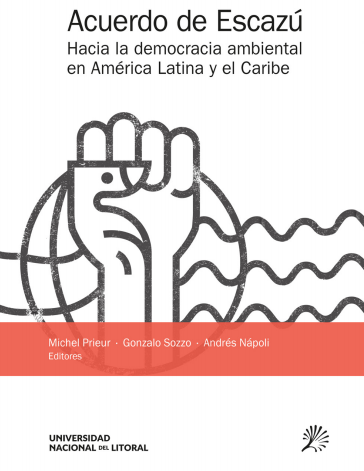
Autor: Prieur, Michel; Sozzo, Gonzalo; Nápoli, Andrés
Fecha: 2020-11-17
“Acuerdo de Escazú. Hacia la democracia ambiental en América Latina y el Caribe” is a fundamental work on the present and future of environmental law, from the Collection Science and Technology (UNL Publishing), published by the International Center for Comparative Environmental Law (CIDCE), whose editors are Michel Prieur (Professor Emeritus of the University of Limoges, France), Gonzalo Sozzo (professor at the National University of the Littoral of Santa Fe in Argentina, specialist in damages law and expert in environmental law) and Andrés Nápoli (director of the Fundación Ambiente y Recursos Naturales – FARN), with a prologue by Alicia Bárcena and a presentation by Pedro Sánchez Izquierdo.
Written entirely in Spanish, the book is divided into seven parts and is available by clicking on the link above. It deals with various aspects of the Escazú Agreement, which came into force on April 22, and is the first regional environmental treaty in Latin America and the Caribbean. Its ultimate goal is to guarantee the right of current and future generations to a healthy environment and sustainable development through access to information, public participation and access to justice, capacity building and cooperation. It is also the first treaty in the world to establish specific provisions for the promotion and protection of environmental human rights defenders to ensure that they can carry out their work without fear of reprisal.
“This is an international environmental law agreement of great importance, given that it is the first regional environmental agreement in Latin America, with a very strong perspective and link to human rights that are visible in this agreement, mainly dedicated to access to public information on the environment, citizen participation in environmental decisions and access to justice,” summarized Gonzalo Sozzo, one of the editors of the book.
“Acuerdo de Escazú. Hacia la democracia ambiental en América Latina y el Caribe” es un libro fundamental sobre el presente y futuro del derecho ambiental, de la Colección Ciencia y Tecnología (Ediciones UNL), publicado por el Centro Internacional de Derecho Comparado Ambiental (CIDCE), cuyos editores son Michel Prieur (Profesor Emérito de la Universidad de Limoges en Francia), Gonzalo Sozzo (docente de la Universidad Nacional del Litoral de Santa Fe en Argentina, especialista en Derecho de Daños y experto en Derecho Ambiental) y Andrés Nápoli (director de la Fundación Ambiente y Recursos Naturales – FARN), con prólogo de Alicia Bárcena y presentación de Pedro Sánchez Izquierdo.
Redactado integralmente en español, el libro consta de siete partes y está disponible haciendo clic en el enlace antes mencionado. Aborda diversos aspectos del Acuerdo de Escazú, que constituye el primer tratado regional ambiental de América Latina y el Caribe. Su objetivo último es garantizar a las generaciones presentes y futuras el derecho a un medio ambiente sano y al desarrollo sostenible mediante el acceso a la información, la participación pública y el acceso a la justicia, el fortalecimiento de capacidades y la cooperación, además de ser el primero en el mundo que establece disposiciones específicas para la promoción y protección de los defensores de derechos humanos en asuntos ambientales, de modo de asegurar que puedan desempeñar su labor sin temor de represalias.
“Se trata de un acuerdo de derecho internacional ambiental de una relevancia singular dado que es el primer acuerdo ambiental regional en América Latina, con una muy fuerte perspectiva y conexión con los derechos humanos que se visibiliza en este Acuerdo, dedicado básicamente el acceso a la información pública ambiental, la participación ciudadana ambiental en decisiones ambientales y el acceso a la justicia”, sintetizó uno de los editores del libro, Gonzalo Sozzo.